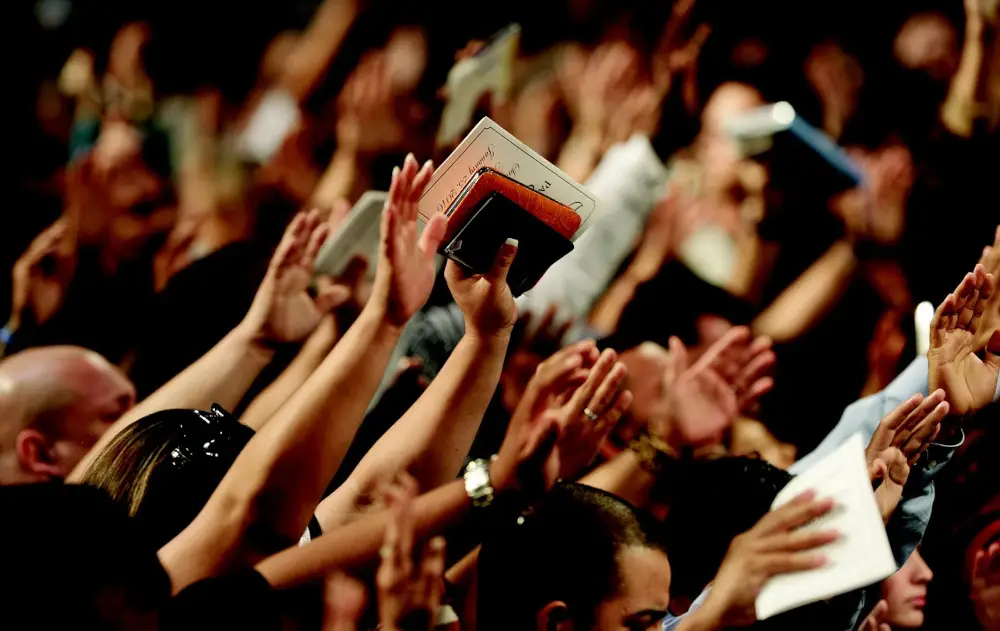The statement that “the kingdom of God is within you” is one of the most powerful and misunderstood statements by Jesus in the Bible.
What exactly did Jesus mean when he told the Pharisees that the kingdom of God is within you (Luke 17:21 KJV)?
This article will explore the meaning, context, and significance of this profound teaching on the kingdom of God.
The kingdom of God was the main theme of Jesus’ teaching and ministry. He proclaimed that the long-awaited kingdom of God had come near and urged people to repent and believe the good news.
Many expected the Messiah to establish an earthly kingdom, so Jesus’ statement about the kingdom being “within you” was surprising and confusing to his listeners.
Let’s examine the context and original language to unlock the meaning of this verse.
What is the Kingdom of God According to Jesus?

Throughout his ministry, Jesus repeatedly talked about the kingdom of God, emphasizing it as God’s dynamic reign and rule over all creation.
The coming of God’s kingdom meant deliverance, restoration, healing, and salvation for God’s people.
Jesus taught that the kingdom had arrived in His Person and ministry. When questioned by the Pharisees Jesus replied,
20 Now when He was asked by the Pharisees when the kingdom of God would come, He answered them and said, “The kingdom of God does not come with observation; 21 nor will they say, ‘See here!’ or ‘See there!’ For indeed, the kingdom of God is within you.”
Luke 17:20-21 (NKJV)
biblegateway.com
The reign of God had entered the world in a new way with the birth, life, teaching, miracles, death, and resurrection of Jesus.
What Did Jesus Mean When He Said The Kingdom of God is Within Us?

Luke 17 recounts Jesus teaching his disciples about the coming of the kingdom and answering a question from the Pharisees about its arrival.
Jesus had just described how the Son of Man would be revealed in the end times, referring to his second coming (Luke 17:22-37).
Just before this, the Pharisees asked Jesus “when the kingdom of God would come” (Luke 17:20).
Many first-century Jews were expecting a Messiah who would overthrow the Roman empire and usher in a new era of blessings and prosperity for Israel.
Jesus’ response that “the kingdom of God is within you” comes as an answer to their question about the timing and the nature of the coming kingdom.
Jesus contrasted the visible, outward establishment of an earthly kingdom to the unseen, inward reality of the kingdom already present in the world.
Who was Jesus Speaking to When He Said This?

Luke 17 specifies that Jesus responded directly to the Pharisees when he declared, “The kingdom of God is within you.”
The Pharisees were part of the religious establishment, which focused on strict observance of the law and ritual purity.
They opposed Jesus’ message of grace, His welcoming of outcasts, and His claim to forgive sins.
Earlier in the Book of Luke, Jesus criticized the Pharisees for neglecting justice and the love of God and pronounced woes on them (Luke 11:37-54).
In this encounter, Jesus again challenged their worldview. They were looking for a political kingdom, while Jesus asserted that the kingdom is first about God’s work in people’s hearts and lives.
What Does “Within You” Mean in the Original Greek?

The English phrase “within you” in Luke 17:21 translates the Greek phrase “entos hymon.”
Entos means “within” or “among” and hymon is a second-person plural pronoun meaning “of you” or “your.”
So a literal rendering would be “the kingdom of God is among you” or “within your midst.”
The kingdom was present in Christ who stood before the Pharisees as he spoke the words.
Jesus asserted that God’s dynamic reign was already active and apparent if they had eyes to see it.
How Should We Understand the Kingdom in Luke 17:21?

Jesus’ statement about the kingdom calls for an inward, spiritual understanding, not simply an outward, political one.
God’s rule is at work in the world through Christ and manifests in the hearts of those who follow him.
Where Jesus is present and people yield to God’s will, the kingdom has arrived. The reign of God has been inaugurated but not yet consummated, so it is both present and still to come.
Luke 17:21 does not imply an inward, private experience. The kingdom is not just an internal state of mind or feeling. It transforms all of life’s relationships and structures.
The transformation starts within, in the hearts and character of God’s people living under his reign.
The kingdom was being established in the words, works, and person of Jesus and would one day fill all creation.
Is the Kingdom of God Inward and Spiritual or Outward and Physical?

Throughout the Gospels, Jesus paints a multi-faceted picture of the kingdom that resists narrow categorization as either purely inward or outward.
In the Sermon on the Mount, Jesus announced blessings for those already participating in the kingdom through inward realities like poverty of spirit, meekness, and mercy (Matthew 5:3-12).
He instructed his followers to seek first the kingdom of God and his righteousness (Matthew 6:33).
The coming of the kingdom also has visible, public dimensions. Jesus proclaimed good news to the poor, freedom for the oppressed, healing for the sick, and light shining in the darkness.
The kingdom confronts evil powers, restores creation, and gathers people from all nations into a new community.
Luke 17:21 warns against thinking the kingdom will arrive with visible pomp and circumstance.
Jesus shows the kingdom as reshaping both the inner lives of people and the external world around them.
What Did Other Biblical Authors Say About the Kingdom of God?

While the Gospels focus on Jesus’ kingdom proclamation, the theme of God’s reign runs throughout Scripture.
In the Old Testament and Jewish thought, God was understood to be sovereign over all. But the people of Israel also hoped for a future ideal kingdom on earth where God’s will would be done.
The New Testament presents the kingdom as inaugurated in the life and work of Jesus. However, its final consummation awaits the future.
The already/not yet pattern continues in Acts and the Epistles, which portray kingdom people living now as citizens of heaven (Philippians 3:20 NKJV) while awaiting the full establishment of the kingdom in the new creation.
“For our citizenship is in heaven, from which we also eagerly wait for the Savior, the Lord Jesus Christ.”
biblegateway.com
Comparison with mustard seeds and leaven in Matthew 13 reveals that the kingdom starts small but inevitably grows and spreads throughout the earth.
The Book of Revelation completes the story as all things are made new under Christ’s reign in the New Jerusalem.
How Did the Early Church View This Passage?

In the early centuries of the Christian movement, church fathers like Origen and Augustine reflected extensively on what Jesus meant when he said the kingdom of God is within you.
Augustine linked the interior kingdom to Jesus’ call to love God with heart, soul, mind, and strength.
Clement of Alexandria connected it to the indwelling of the Holy Spirit in believers.
Early Christian theologians associated the “kingdom within” primarily with the soul. Others like Chrysostom maintained that while the kingdom does transform individuals inwardly, this personal renewal inevitably shapes families, societies, and cultures for Christ. The kingdom is both interior and all-encompassing.
Throughout history, Luke 17:21 has provided hope that the redemptive reign of God can dwell in ordinary people and bring change to the world.
What are the Implications and Meaning for Us Today?

Jesus’ surprising statement that the kingdom of God is within you continues to prompt reflection on the nature of God’s reign today.
Here are a few key implications to remember:
- God’s rule is manifested in the world wherever Jesus is King—in hearts, lives, relationships, communities, cultures, and creation. We do not build the kingdom but receive it as a gift and seek its furtherance.
- We are not called to await a future kingdom, but to live now as kingdom citizens under Christ’s reign, being inwardly renewed and bearing righteous fruit in the world.
- While the kingdom transforms society, its starting point is inner transformation. Outward reform depends on the conversion of our desires, thoughts, and character to become more Christ-like.
- The kingdom comes not by human power but by embracing the way of Jesus—the way of sacrificial love, courageous truth, justice, mercy, and servanthood.
- God’s kingdom brings hope—renewal has begun! Waiting and longing continue, as the kingdom’s fullness is not yet here. We live in the tension of the “already” and the “not yet.”
Jesus’ remarkable statement continues to reshape our vision that we might discern the kingdom of God at work in our midst, within, and among us.
May we seek first this kingdom each day!
Key Takeaways on the Meaning of “The Kingdom of God is Within You”
- The kingdom of God was the main theme of Jesus’ teaching. He proclaimed its arrival and visible manifestation in his own person and ministry.
- When asked by the Pharisees about when the kingdom would come, Jesus said it was already “within your midst”.
- Jesus contrasted the visible, outward establishment of a political kingdom with the unseen, inward reality of the kingdom already present in the world through him.
- The Greek phrase “entos humon” means “within you” or “among you”, referring to the incarnate Christ in their presence.
- God’s kingdom starts inwardly, renewing hearts and lives to transform families, societies, cultures, and creation.
- We live now as citizens of God’s kingdom, which has been inaugurated but not yet fully consummated in the new creation.
Frequently Asked Questions
Q. What is the kingdom of God?
A. The kingdom of God refers to God’s dynamic reign, rule, and authority over all believers. It came into the world through the life, ministry, death, and resurrection of Jesus.
Q. Is the kingdom present or future?
A. The testimony of Jesus and the New Testament present the kingdom as already here and still to come—inaugurated but not yet fully consummated. It has already come in Christ, but its ultimate fulfillment awaits the future.
Q. Where is the kingdom located?
A. The kingdom is not limited to a geographic location or realm outside Earth. Wherever God reigns in people’s hearts and Christ is Lord, the kingdom is present. It transforms both interior lives and the external world.
Q. Can we build the kingdom of God?
A. No, we do not build God’s kingdom. It is a gift of God’s grace received in humble faith. We are called to seek the furtherance of the kingdom, praying and working for the increase of God’s will “on earth as in heaven.”
Q. What did Jesus mean when he said the kingdom is “within you”?
A. Given the Greek phrase and context, Jesus is asserting that the kingdom is already present in Him as He is speaking to the Pharisees. The reign of God is apparent if they have eyes to see it at work in the life and work of Jesus.
Q. How does the kingdom of God transform societies?
A. As individuals are converted and inwardly renewed in Christ, this personal transformation influences families, communities, cultures, politics, economics, and creation. Authentic inner change naturally flows outward to bring blessings to the world.







I have never read anything given the explanation of the Kingdom is within like this Thank you for this I am going to use it wisely~ God Bless you!